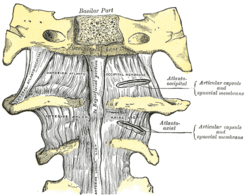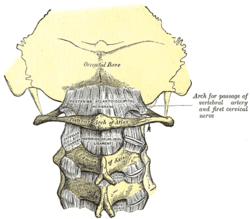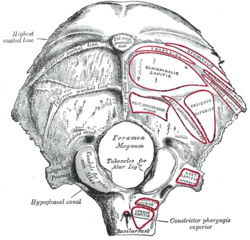Atlanto-occipital joint
The atlanto-occipital joint (articulation between the atlas and the occipital bone; Capsula articularis atlantooccipitalis) consists of a pair of condyloid joints. The atlanto-occipital joint is a synovial joint.
| Atlanto-occipital joint | |
|---|---|
 Anterior atlantoöccipital membrane and atlantoaxial ligament. | |
 Posterior atlantoöccipital membrane and atlantoaxial ligament. | |
| Details | |
| Identifiers | |
| Latin | Articulatio atlantooccipitalis |
| MeSH | D001269 |
| TA | A03.1.08.001 |
| FMA | 24939 |
| Anatomical terminology | |
Ligaments
The ligaments connecting the bones are:
- Two articular capsules
- Posterior atlanto-occipital membrane
- Anterior atlanto-occipital membrane
Capsule
The capsules of the atlantooccipital articulation surround the condyles of the occipital bone, and connect them with the articular processes of the atlas: they are thin and loose.
Motions
The movements permitted in this joint are:
- (a) flexion and extension around the mediolateral axis, which give rise to the ordinary forward and backward nodding of the head.
- (b) slight lateral motion, lateroflexion, to one or other side around the anteroposterior axis.
Flexion is produced mainly by the action of the longi capitis and recti capitis anteriores; extension by the recti capitis posteriores major and minor, the obliquus capitis superior, the semispinalis capitis, splenius capitis, sternocleidomastoideus, and upper fibers of the trapezius.
The recti laterales are concerned in the lateral movement, assisted by the trapezius, splenius capitis, semispinalis capitis, and the sternocleidomastoideus of the same side, all acting together.
Additional images
 Occipital bone. Outer surface.
Occipital bone. Outer surface.
References
This article incorporates text in the public domain from page 295 of the 20th edition of Gray's Anatomy (1918)